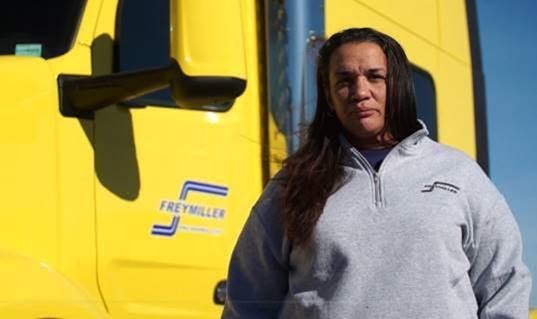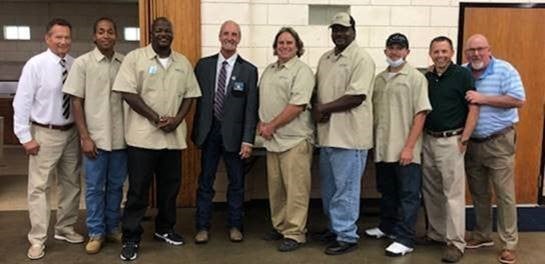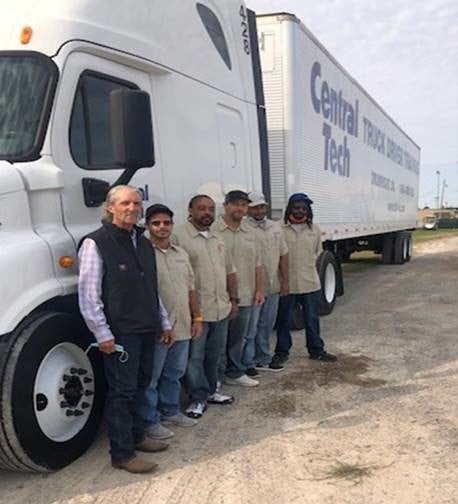Success isn’t always determined by monetary gain. In fact, many would say true success is through the impact we make on others. At Freymiller, it’s what guides them in much of what they do. It’s also the driving force behind its Second Chance Program – a partnership between the Oklahoma Department of Corrections (ODOC), Career Tech, Central Tech Truck Driving School (Central Tech) and Freymiller which focuses on improving the lives of former felons by training them to become professional truck drivers.
When Betsy Waldrop was only a month or two into her role as Recruiting and Training director for Freymiller, president and CEO David Freymiller approached her with the idea of starting a second chance program. The company relocated to Oklahoma City in 1994 and received incredible support from the state of Oklahoma, so Freymiller felt God was calling the company to give back.
“Honestly, it scared me. It felt like such a big task and I didn’t know where to begin,” says Waldrop. “I sat on it for a couple of days worrying about it.”
The next weekend, Waldrop was watching television and happened to see Kris Steele, former Speaker of the House in Oklahoma, sharing about an organization he’s a part of which uses education and training to break the cycle of incarceration. Monday, she reached out to him and told him about the idea.
“He got me in touch with the right people I needed to talk to and I had meetings scheduled within a week,” she adds.

John Thorpe is the director of Central Tech Truck Driving School. They had tried starting a similar program before but had been unable to make it work.
“We just hit a lot of roadblocks,” Thorpe explains. “We tried to work with the ODOC for two or three years and could never make it happen.”
When he got a call from Career Tech, which offers career and technology education to inmates, and heard Freymiller was interested in hiring formerly incarcerated individuals, he was willing to give it another chance.
“Freymiller’s involvement changed everything. When you have a company like Freymiller who will back and hire these people right when they get out of prison, it is invaluable,” he says. “This is a partnership like no other in the industry. It’s taken us four years to master this program and we’re proud of what we’re doing here.”
There are a number of trucking companies around, who will take drivers who have conviction records. Typically, says Waldrop, these individuals must have convictions which are seven years old or more. Freymiller’s Second Chance Program is unique in they provide opportunities for incarcerated individuals who live in Oklahoma as soon as they get out of prison. These potential drivers go through an extensive vetting process to ensure they are the right candidates for the program.
“We’re in the business of changing lives,” explains Waldrop. “These drivers are breaking the cycle.”

The Second Chance Program started with a test pilot class of six individuals on probation. Waldrop, Thorpe and Barrett Richardson, project manager for Career Tech, all agree they learned a lot through the pilot class. Specifically, they gained valuable insight on the types of potential students they were looking for and how to fine-tune their vetting process.
“Throughout this process, we’ve learned how to pick the right people,” explains Thorpe. “We’ve also found interviewing them together really helps because these students are able to understand the expectations of the school and Freymiller.”
Richardson is first in line with the vetting process. He has a network of probation officers and counselors which work with offenders and he relies on them for referrals. Occasionally he also hears directly from individuals who’ve learned about the program through word of mouth.
“I’ve kept this program a little close to my vest because I didn’t want to get overwhelmed. We can only train so many people per fiscal year,” says Richardson. “We also want to make sure these people understand what the process entails and are willing to work hard to make it happen.”
The process is time consuming. Many incarcerated individuals lose their driver’s licenses while in prison and have to work toward getting it back. Richardson and his team help these individuals gather the required documents. There’s also a cost involved and it can take months to get in for a driver exam.
“A lot of these guys are on work release status and save a portion of their money for when they get out,” he explains. “We have to identify potential students who actually have the means to be able to gather all the documents they need and who are financially able to get these first steps going.”
Richardson says they also look for candidates who are committed to their sobriety, noting many of these individuals are drug and property offenders. He meets with probation officers, looks at their drug tests and really gets to know these people through the process.
“The number one thing is we’re choosing people who will be safe,” he adds. “We also look for individuals who show a high level of maturity. People who are ready to close this chapter of their lives and make something of themselves.”

The vetting process can take several months to finish, which gives potential students plenty of times to mess up. Richardson, Thorpe, and Waldrop all make it very clear this is a second chance program – no third chances are given. Waldrop also proudly notes in the four years this program has been in motion, they have not had a single incident with felons they’ve taken over the road.
Once individuals are accepted in the program, they go through an intensive 28-day training program at Central Tech. Thorpe and his team teach these students everything they’ll need to know to become great drivers. They attend classes mixed with the school’s traditional driver students.
“From the very beginning, we’re all about protecting these students. We always stress to them this new beginning starts with a clean slate,” says Waldrop. “We don’t go around telling people these are second chance students – they’re just another student like everyone else. When they get to Freymiller, it’s the same thing. Outside of a handful of people, no one knows their story.”
Out of the hundreds which have gone through the program, Freymiller has hired about 30 individuals many of which are still employed with Freymiller. They also recently were given approval to begin women’s classes and two of those graduates are now working for the company.
“Even though drivers may not always end up at Freymiller, our main goal was always to give back to the state and provide employment for these individuals. As long as they are gainfully employed we’ve done our part.” Waldrop adds. “This program is changing lives.”
Thorpe and Richardson agree.
“The majority of people in the prison system today will be out in 3-5 years. They’re coming back to our communities. They have to have a job which pays enough to pay rent and build a future,” says Richardson. “With this second chance program with Freymiller, these guys can be making $70-$90k a year or more. It’s a career. It’s life changing money.”
“A lot of the men and women we’ve trained through this program, they’re good people who just messed up and got caught,” Thorpe adds. “I’ll admit I was a skeptic. Now since I’ve seen what it’s done for people, it’s one of the best things we’ve done at our school. I think once other states see what we’ve done here, you’re going to see a lot more of it too.”
They also agree this program wouldn’t exist without Freymiller.
“It makes us feel really good to hear and know all the years of work was worth it,” says Waldrop. “We’re glad we can make a positive impact on the state of Oklahoma and have others see what we do. I’ve been in this industry for 20 years and this is the most fulfilling project I’ve ever worked on.”
Waldrop wants companies in other states to know a program like Freymiller’s doesn’t happen overnight. It takes a lot of work and requires significant perseverance to build a similar program from the ground up.
“We kept this under wraps for quite a while because we wanted to make sure this really worked,” she adds. “This is an incredible way to bring good drivers into your fleet. Even more, it gives these individuals a way out and the opportunity to change their lives. They’re getting married, buying houses, saving for retirement and finally feel like they have hope for the future.”
This is sponsored content










